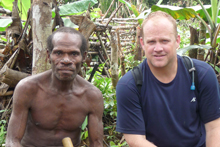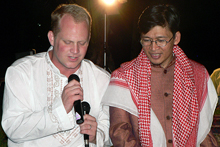James Hoesterey's specialty is Islam, yet his focus is not the Middle East, but Southeast Asia. Considering that 60 percent of the world's Muslims are in Asia, that's a pretty big territory to cover.
Hoesterey, the newest faculty member in Emory's religion department, is focused on the future of this so-called Asian Century. His teaching and writing embrace the fast-growing influence of Islam, media and pop culture in a part of the world where new figures of religious authority are speaking on behalf of Islam.
Hoesterey comes to the religion faculty at Emory University as a cultural anthropologist, but that's just the point, says Gary Laderman, professor of religion and chair of the search committee that brought Hoesterey to campus.
"He adds to the mix that's already in the department in terms of the interdisciplinary breadth we have," says Laderman, adding that Hoesterey's interests coincide with several strengths at Emory, including Islam, film and media studies, and anthropology.
Hoesterey seems to have no trouble with the big picture. His academic background contains unexpected twists and big academic territories. He started out as an undergraduate majoring in psychology—then a trip to West Papua, Indonesia, with a documentary film crew and living among a highland tribe called the Dani, changed everything.

Hoesterey (right) spent time off and on during the 2000s working on documentary films for Discovery Channel, Travel Channel, BBC and National Geographic. He is pictured here with Katual, a Korowai man he has known since 2003.
"That experience gave me gave me a different cultural vantage point," he says. Hoesterey was struck that the Dani were aghast at the American concept of nursing homes. He began to think of his interest in emotion, the family system and psychology in a much broader way.
Those insights led him to master's and Ph.D. degrees in cultural anthropology, drawing together Islamic pop culture and the politics of public piety.
Interspersed with his degree work, Hoesterey spent time off and on during the 2000s working on documentary films for Discovery Channel, Travel Channel, BBC and National Geographic. "A lot of the perspectives I gained have been based on going into areas with a film crew," he says.
Hoesterey's interest in Indonesia, Islam and pop culture eventually led to an unusual research project: two years of ethnographic study focusing on Indonesian television preacher and self-help guru, K.H. Abdullah Gymnastiar, also known as Aa Gym.
"Aa Gym ("elder brother" Gym) represents a new generation of popular preachers across the Muslim world who are media savvy and who appeal to the expanding Muslim urban middle class who aspire for both piety and prosperity," says Hoesterey. "An American equivalent would be a combination of Oprah Winfrey, Dr. Phil and Joel Osteen wrapped into one."
Hoesterey's plan was to gain access to Gymnastiar's inner circle and follow him around, a well-known trend in anthropology called "multi-sited ethnography" rather than the traditional concept of an anthropologist in a single remote village.
His project adviser was skeptical about whether he could gain the necessary access to carry out the project. "He said, 'What makes you think this guy is going to let you follow him around?' I admit it did require a leap of faith during the grant-writing stage."
Three weeks after arriving at Gymnastiar's Islamic school in Indonesia, Hoesterey was invited to go on holiday at the end of Ramadan with the family and the entire entourage. "I found myself sitting around with the family and singing John Denver songs. So life took a weird turn. But I got lucky; [Gymnastiar] wanted to show me the 'real Islam.'"

Hoesterey was able to gain access to Indonesian television preacher and self-help guru, K.H. Abdullah Gymnastiar, also known as Aa Gym, for a research study.
Just as improbable as Hoesterey's ability to gain access to a skyrocketing national celebrity (an astounding one-third of Indonesian TV viewers watched Aa Gym's shows), was the preacher's fall from grace. The revelation in 2006 that Aa Gym had taken a second wife was a scandal that shocked the nation. Overnight Gymnastiar's empire transformed from a wildly successful and influential money machine to a struggling enterprise.
"I never could have predicted what happened," says Hoesterey. But Gymnastiar's rise and fall provided new insights on a vast array of developments in modern Indonesia, from the self-help industry, to new forms of religious authority, to the changing landscape of modern Islam in the world's largest Muslim country.
Hoesterey's current book project on Gymnastiar, titled "Sufis and Self-Help Gurus: The Cultural Politics of Public Piety," is one of what he hopes will be many more investigations of the intersection of Islam and the modern world. Now that he's at Emory, Hoesterey is taking students along on the journey, teaching courses on religion and politics and Islam, media and pop culture.
For his part, Hoesterey is having a great time so far. Students in his course on Islam, media and pop culture are confronting issues such as "Is freedom of speech secular? Cartoons, Comics and Muslim Superheroes" and "Sex, Piety and Polygamy on the Silver Screen."
"These are really touchy subjects," says Hoesterey, adding, "We teach what most people tell you not to discuss at the dinner table."
Chas Abdel-Nabi, a senior anthropology major in the course, says he believes these topics represent the future of religious study—examination through the lens of culture.
Students in Hoesterey's religion and politics course are grappling with a wide range of ideas about religion in a broader context, from Islam and democracy in Egypt, religion and politics in the United States, to Hindu nationalism in India.
"Part of students' assignment at the end of the semester is to write their religiopolitical autobiographies," says Hoesterey. "So people are going through interesting and sometimes really difficult processes of introspection."
Freshman Leah Michalove believes that process is entirely the point.
"I think there's only so much good you can do from Ivory tower academic inquiry," she says. "We can sit and talk all we want about Hindu nationalism in India sitting in our little classroom in Atlanta, but I don't think the information has a real learning impact until you apply it."

